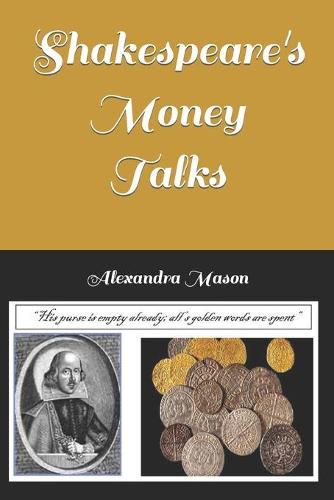Readings Newsletter
Become a Readings Member to make your shopping experience even easier.
Sign in or sign up for free!
You’re not far away from qualifying for FREE standard shipping within Australia
You’ve qualified for FREE standard shipping within Australia
The cart is loading…






In this long-awaited revised and expanded second edition of Econolingua, now entitled Shakespeare’s Money Talks, Alexandra Mason, Ph.D., offers an easily-accessible classic reference work to all lovers of Shakespeare and his dramatic times: scholars, actors and directors, teachers and students, readers and re-readers, and aficionados of history, culture, and society. Shakespeare’s world–and his characters–come to life in this study of metaphor as they self-consciously test the limits of words and their exchange function in establishing social hierarchy, social status and value. Renaissance drama is revealed as a dynamic marketplace of exchange and assessment in which characters discover and test their relational worth. Each glossed term conveniently gives the phrase of its usage in the entry, both the literal and the metaphorical for full illumination. Introductory and supplemental essays catalogue dramatic usage of econolingua (terms related to coins, money, and value) and discuss Usury and the Right Uses of Wealth and Shakespeare’s Economics, the impact of a changing system of social value on the structures of his plays.
The study has been compared in scope and significance to Eric Partridge’s classic Shakespeare’s Bawdy. Critics have high praise for the continued relevance of Mason’s work, which set the standard for an entire school of economic studies of Shakespeare and his times. This is a volume to be treasured, and consulted regularly. It is itself a treasury of knowledge that leads us to appreciate the dramatic artistry of Shakespeare and his contemporaries ever more profoundly. Students and teachers, old-fashioned explicators and new-fashioned historians-all will find here a valuable reference work … interesting for its own sake. Jane Donawerth in Shakespeare Quarterly
Invaluable … her volume remains an exceptionally valuable collection of material. B. J. Cook, Curator of Early Modern Coins, British Museum
A foundational study. Katherine Gillen, author of Chaste Value
A most important study on Shakespeare economics. Henry W. Farnam, author of Shakespeare e economia
An indispensable tool …an extraordinary range of meaning and connotation … ushering in a deluge of economically-oriented studies. David Hawkes, author of Shakespeare and Economic Theory
Extraordinarily helpful. I keep it on my desk, always at hand. Paul A. Jorgensen, author of Lear’s Self-Discovery and Our Naked Frailties
Shakespeare’s Money Talks is the kind of reference work I longed for many years ago when I was first captivated by Shakespeare’s metaphors. More than just a fascinating glossary, this study shows why proper understanding of Renaissance art and culture requires that we follow the money: not via marketplace exchanges, but rather thought and speech that either governs or is governed by them. Lana Cable, author of Carnal Rhetoric
$9.00 standard shipping within Australia
FREE standard shipping within Australia for orders over $100.00
Express & International shipping calculated at checkout
In this long-awaited revised and expanded second edition of Econolingua, now entitled Shakespeare’s Money Talks, Alexandra Mason, Ph.D., offers an easily-accessible classic reference work to all lovers of Shakespeare and his dramatic times: scholars, actors and directors, teachers and students, readers and re-readers, and aficionados of history, culture, and society. Shakespeare’s world–and his characters–come to life in this study of metaphor as they self-consciously test the limits of words and their exchange function in establishing social hierarchy, social status and value. Renaissance drama is revealed as a dynamic marketplace of exchange and assessment in which characters discover and test their relational worth. Each glossed term conveniently gives the phrase of its usage in the entry, both the literal and the metaphorical for full illumination. Introductory and supplemental essays catalogue dramatic usage of econolingua (terms related to coins, money, and value) and discuss Usury and the Right Uses of Wealth and Shakespeare’s Economics, the impact of a changing system of social value on the structures of his plays.
The study has been compared in scope and significance to Eric Partridge’s classic Shakespeare’s Bawdy. Critics have high praise for the continued relevance of Mason’s work, which set the standard for an entire school of economic studies of Shakespeare and his times. This is a volume to be treasured, and consulted regularly. It is itself a treasury of knowledge that leads us to appreciate the dramatic artistry of Shakespeare and his contemporaries ever more profoundly. Students and teachers, old-fashioned explicators and new-fashioned historians-all will find here a valuable reference work … interesting for its own sake. Jane Donawerth in Shakespeare Quarterly
Invaluable … her volume remains an exceptionally valuable collection of material. B. J. Cook, Curator of Early Modern Coins, British Museum
A foundational study. Katherine Gillen, author of Chaste Value
A most important study on Shakespeare economics. Henry W. Farnam, author of Shakespeare e economia
An indispensable tool …an extraordinary range of meaning and connotation … ushering in a deluge of economically-oriented studies. David Hawkes, author of Shakespeare and Economic Theory
Extraordinarily helpful. I keep it on my desk, always at hand. Paul A. Jorgensen, author of Lear’s Self-Discovery and Our Naked Frailties
Shakespeare’s Money Talks is the kind of reference work I longed for many years ago when I was first captivated by Shakespeare’s metaphors. More than just a fascinating glossary, this study shows why proper understanding of Renaissance art and culture requires that we follow the money: not via marketplace exchanges, but rather thought and speech that either governs or is governed by them. Lana Cable, author of Carnal Rhetoric